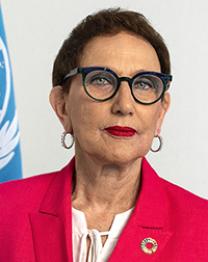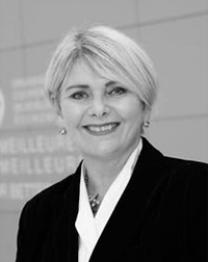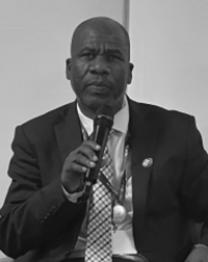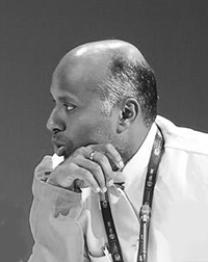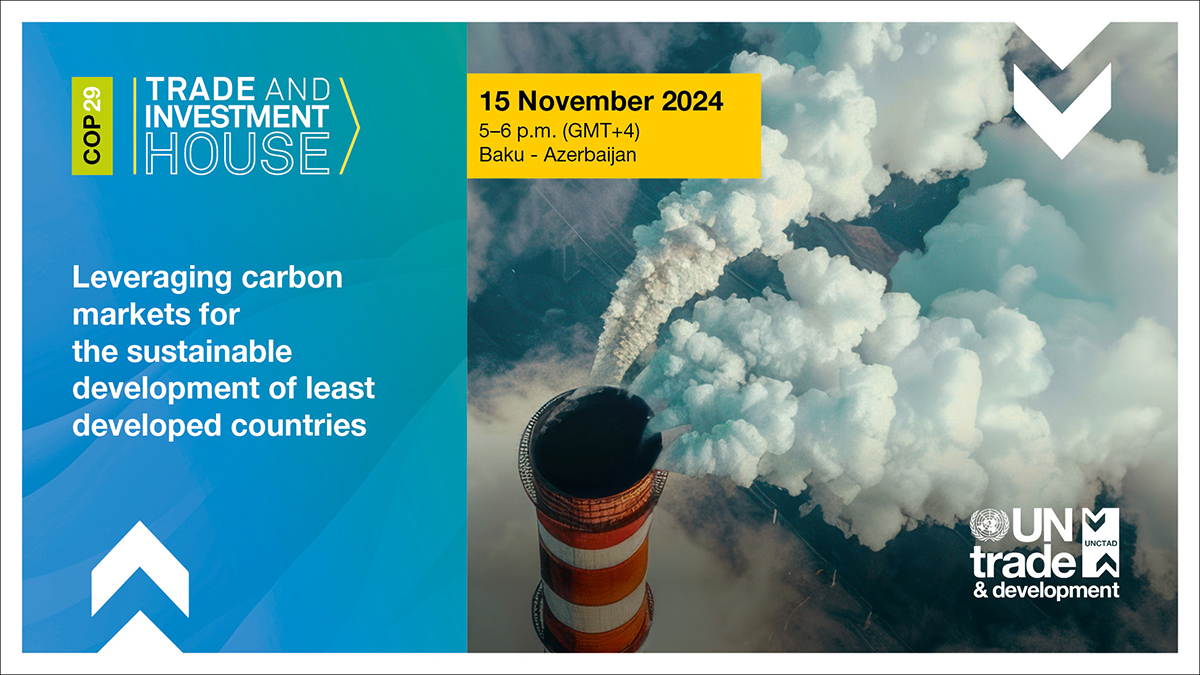
Carbon markets are undergoing a major transition towards a new regime under the aegis of the Paris Agreement. High hopes are placed on them as a means to unlock finance and accelerate the development of the least developed countries (LDCs). At the same time, participation in these markets presents challenges and pitfalls for these countries.
First, it requires major development in LDC institutions and administrative structures, which is costly and requires the necessary resources to be mobilized. Second, participation in carbon markets can potentially jeopardize the medium-term development policy space of LDCs and render their future climate policy more difficult to implement. LDCs therefore need to carefully balance the potential benefits and possible challenges involved with making use of carbon markets.
Objective
This event will discuss the policies and strategies that LDCs can put in place with the support of their development partners in order to leverage carbon markets so that they become part of their policy toolkit for the pursuit of sustainable development. The panel is expected to yield actionable advice and recommendation for LDC policymakers and for the international community.
The main findings of UNCTAD’s The Least Developed Countries Report 2024: Leveraging Carbon Markets for Development, released ahead of COP29, will be presented and discussed in this event.
Keynote speaker
- Ms. Rebeca Grynspan, Secretary-General, UN Trade & Development
Panelists
- Ms. Ragnheiður Elín Árnadóttir, Director, OECD Development Centre
- Mr. Evans Njewa, LDC Group Chair
- Mr. Gabriel Labbate, Head of Climate Mitigation Unit, UNEP
- Mr. Perumal Arumugam, Manager, Intergovernmental Negotiations and Stakeholder Interaction, Mitigation Division, UNFCCC Secretariat
In September 2021, Rebeca Grynspan was appointed Secretary-General of the United Nations Conference on Trade and Development (UNCTAD), becoming the first woman to lead the organization in its 60-year history.
Rebeca Grynspan, an economist and former Vice President of Costa Rica, is an experienced leader of international institutions with a substantive track record in government, UN diplomacy, economic policy and multilateral cooperation at the global level.
Prior to joining the United Nations, she was Vice President of Costa Rica and held cabinet positions as Minister of Housing, Minister Coordinator of Economic and Social Affairs and Deputy Finance Minister.
Previously, she served as Secretary-General of the Ibero-American Conference (2014–2021), chairing regional summits of Heads of State and Government; United Nations Under-Secretary-General and Associate Administrator of the United Nations Development Programme (UNDP); and UNDP Regional Director for Latin America and the Caribbean. She was a member of the UN Commission for the Reconstruction of Haiti, representing the UN Secretary-General.
At UNCTAD, Grynspan has been at the centre of critical negotiations to address global trade and development challenges. She played a decisive role in the successful Black Sea Grain Initiative brokered between the UN, Türkiye, the Russian Federation and Ukraine, which enabled the safe export of over 32 million tons of grain, lowered global food prices by 22% and prevented millions from falling into food insecurity. She also leads the UN Global Crisis Response Group on food, energy and finance, and has represented the UN in G20 summits.
Her leadership has been recognized widely. In 2024, she received the Doha Negotiator of the Year Award for spearheading UN efforts to restore Black Sea trade routes. In 2025, Spain’s Ministry of Foreign Affairs, European Union and Cooperation awarded her the inaugural Isabel Oyarzábal Women in Multilateralism International Prize for her contribution to multilateralism.
Ms. Grynspan holds degrees in economics from the University of Costa Rica and the University of Sussex, and honorary doctorates from several European universities.
Ragnheiður Elín Árnadóttir has been the Director of OECD Development Centre since 16 August 2021.
Ms. Árnadóttir served as Minister of Industry and Commerce in Iceland from 2013-2017 and was an elected Member of Parliament for the Independence Party from 2007-2016.
Before being elected to Parliament, she was successively a political advisor to the Minister of Finance, the Minister of Foreign Affairs and the Prime Minister. She also worked for the Trade Council of Iceland both in New York and in Reykjavík.
A nonresident Senior Fellow at the Atlantic Council's Global Energy Centre, she was also a Board member of RÚV (Icelandic National Broadcasting Company) and of the American-Icelandic Chamber of Commerce. She was the Chairman of the Board of Directors of Duty Free Iceland, and a member of the Board of Directors of Landsvirkjun (national power company).
Ms. Árnadóttir has a Master’s Degree in Foreign Service from Georgetown University in Washington, D.C., and a Bachelor’s Degree in Political Sciences from the University of Iceland.
Gabriel Labbate is the Head of the Climate Mitigation Unit and Global Team Leader of the UN-REDD Programme at UNEP. He has more than 20 years of experience in the interphase of environment, poverty, and human development.
He has worked on environmental valuation, quantitative poverty analysis, cost-benefit analysis of REDD+, and the integration of social issues into land use and biodiversity conservation policies.
Gabriel´s current work focuses on using carbon markets to support high-integrity nature-based solutions to climate change. Gabriel represents UNEP at ICAO/CORSIA and is a member of the UN Task Force on Voluntary Carbon Markets. He is also a Co-Chair of the Expert Panel of the Integrity Council for the Voluntary Carbon Market (IC-VCM).
Gabriel holds a degree in Biology from the University of Buenos Aires, Argentina, a master’s degree in Economics from New York University, and a Ph.D. in Environmental Studies from the University of California, Santa Cruz.
Evans Njewa of Malawi was elected Chair from January 2024 to December 2025.
Evans Njewa is the Chief Environmental Officer, Head of Climate Change and UNFCCC Focal Point for the Government of Malawi. Evans has 20 years of experience in UNFCCC negotiations, serving as Malawi’s lead negotiator on climate change since 2005 and the LDC Group’s lead negotiator on climate finance since 2009.
In Malawi, Mr Njewa was responsible for the Government’s First, Second and Third National Communications, the National Adaptation Programmes of Action, the Biennial Update Report, and Malawi’s Nationally Determined Contributions. He was a Board Member of the Adaptation Fund from 2019-2022, the Green Climate Fund from 2016 – 2017, and a member of the Joint Implementation Supervisory Committee that was overseeing the implementation of Article 6 of the Kyoto Protocol from 2010 – 2014.
Evans holds a Master of Policy Studies from the Southern African Regional Institute for Policy Studies (SARIPS), Zimbabwe and a Bachelor of Science (Agriculture) from the University of Malawi.
Perumal Arumugam is Manager of the Intergovernmental Negotiations and Stakeholder Interaction, Mitigation Division, UNFCCC Secretariat.
He is a chemical engineer by graduation and a post graduate in energy management and certified Energy Auditor, with more than sixteen years of experience in conceptualizing, developing and implementing climate mitigation projects across globe covering varied sectors and technical areas using international financing schemes and mechanisms.
At United Nations Framework Convention on Climate Change (UNFCCC), he manages the work on capacity building initiative on article 6. Providing senior technical advice on substantive technical issues relating to quantification of mitigation benefits across various sectors, including that of the aviation related mitigation methodologies.
At UNFCCC, he also leads and support intergovernmental process of negotiations in relation to the agenda items on all international co-operative and market related mechanisms and issues under the Kyoto protocol (CDM review, CDM guidance and JI guidance) and the Paris agreement (Article 6). He has led negotiations on issues related to eligibility of new HCFC-22 facilities under CDM and issues related to Global carbon reserve for CCS technologies under CDM.
Participating in International civil aviation organization (ICAO) process as Global Market based measures expert in its working groups related to Emission units criteria and registries, also as member of the Alternative fuel task force, and as an advisor to the CAEP member of the UNFCCC to the ICAO in its CORSIA development process.
Prior to joining the UNFCCC, consecutively for four years elected from the Asia pacific region as expert member to support decision making by the CDM – Executive Board in areas of both large and small scale methodologies, assessment of CDM projects and accreditation of DOE. He has experience in implementation of energy efficiency measures in more than 50 industrial facilities. The only member ever to hold all four positions.



